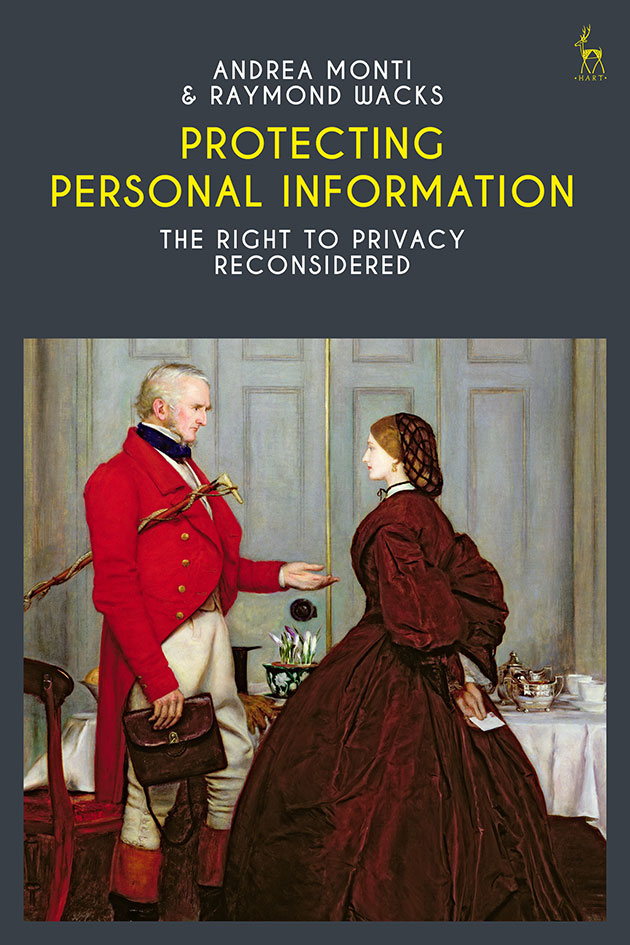 This is the English translation of the review that Axel Spies published on the German review ZD – Zeitschrift für Datenschutz
This is the English translation of the review that Axel Spies published on the German review ZD – Zeitschrift für Datenschutz
Andrea Monti/Raymond Wacks, Protecting Personal Information, Oxford (Hart Publishing) 2019, ISBN 978-1-5099-2485-1, € 60.88
Anyone who wants to deal with the concepts of “data protection” and “privacy” on both sides of the Atlantic on the basis of sources should read Andrea Monti’s and Raymond Wacks’ astute analysis. Monti is adjunct professor at the University of Chieti/Italy and Italian lawyer, Wacks is emeritus professor at the University of Hong Kong – an unusual team of authors. Both are proven practitioners in this field and have been dealing with the subject for many years.
EU law (and thus also German law) has its dear misery with the term “privacy”, which comes from Anglo-American law. The term does not appear in the DS-GVO and in Art. 8 para. 1 ECHR, but it does appear, for example, in Directive 2002/58/EC of 12.7.2002: “concerning the processing of personal data and the protection of privacy in the electronic communications sector (EU-ABl. L 201, 31.7.2002, 37)”. Even the translation of the term “privacy” is difficult in Germany. The term “protection of privacy” does not fit as a term for a right of defence, “privacy” is an artificial word, “informational self-determination” is too short a term.
The authors criticize the conventional concept of privacy. It is too vague, misleads to misunderstandings and abuse and can hardly be delimited legally. The concept of privacy comes from the famous 1890 essay by Warren and Brandeis (4 Harvard Law Review 193). From there, it extended like a plant into many areas of life where it had no place from the original conception. The idea of the protection of privacy is, of course, much older, as the confessional secret of the Catholic Church proves or the painting by Millais of 1862 (“Trust me”) under the title of the book, which shows how a husband demands a letter from his wife, which she holds back behind her back. The authors want to cut the concept of privacy back to its roots. Among other things, a “Protection of Privacy Bill” is required, as the authors present in the appendix to the book. The discussion in Germany is somewhat neglected in the book, although the authors at least mention the Hessian Data Protection Act of 1974 as a data protection law big bang.
A core thesis of the authors is that the concept of personal information should be at the centre of privacy. The authors provide numerous examples to show that the terms “personal data” and “privacy” are not synonyms. The same also applies, by the way, to the term “data protection”, which in the USA is associated more with the understanding that the user locks his computer after work, but not with privacy. Whether the EU legislator will do much better with the overflowing term “personal data” in Art. 4 para. 1 DS-GVO than the Anglo-American legal system with its privacy is an open question. Monti poses the provocative question of whether any data processing under the DS-GVO is automatically an interference with the privacy of the data subject (pp. 111 f.). The authors also ask whether the protection of privacy includes the “right to be forgotten” in Art. 17 DS-GVO. Like other commentators, the authors take a very critical view of this right: why is the right to be forgotten of the plaintiff Coteja in the ECJ decision C-131/12 (ZD 2014, 350 m. Karg – Google Spain), which is fundamental for this right, more worthy of protection than the right of other, much more famous persons whose crimes live on in collective memory? In recourse to Roman history, the infamous conspiracy of Catilina around 63 B.C., Monti lets the “Great Conspirator” Catilina appear with the words: “I am Lucius Sergius Catilina and, after 2000 years now, I deserve to be forgotten” (p. 115). Altogether with all its historical references and remarks from both legal circles (USA/GB compared to continental Europe) the book is a worth reading contribution to the long unfinished debate on what the DS-GVO and other laws should protect as legal right.
Dr. Axel Spies is a lawyer at Morgan Lewis & Bockius LLP in Washington DC and co-editor of ZD.

